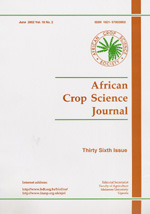
|
African Crop Science Journal
African Crop Science Society
ISSN: 1021-9730
EISSN: 1021-9730
Vol. 13, No. 3, 2005, pp. 193-199
|
 Bioline Code: cs05019
Bioline Code: cs05019
Full paper language: English
Document type: Research Article
Document available free of charge
|
|
|
African Crop Science Journal, Vol. 13, No. 3, 2005, pp. 193-199
| en |
Effect of Inoculation of Indigenous Egyptian Bradyrhizobium sp. Lupini On N Uptake and Yield of Lupin
Raza, S & Jornsgard, B
Abstract
Eight indigenous rhizobial isolates obtained from nodules of non-inoculated white lupins from different climatic regions in Egypt could according to their pattern of intrinsic antibiotic resistance (IAR) to 12 antibiotics be clustered into 4 groups. Antigens from rabbits raised with antigenic material from one isolate of each of the four IAR group gave positive reaction with homologous antigens, while other combinations gave negative results. Agglutination and double diffusion tests confirmed the genetic separation into 4 different groups according to their antigenic structure and the possible grouping of indigenous isolates into specific groups. In a field experiment with inoculation in the traditional lupin growing area in Ismailia, the inoculation with most efficient strain resulted in increased nodulation status, N uptake and yield. At the reclaimed desert area Tahrir the strain ACR 401 gave the highest seed yield, however, the non-inoculated control had also abundant nodulation. At both locations, the seed yield tended to be greater with Rhizobium inoculation than with N fertilizer, which indicated a potential for improvement of N fixation by lupin through the application of efficient rhizobial strains such as ARC 401 and ARC 408. The results from this study suggested that variation in N fixing capacity is due to clear genetic differences among the isolates.
Keywords
Characterisation, competition, indigenous isolates, Lupinus albus L., N-fertiliser
|
| |
© Copyright 2005 - African Crop Science Society
|
|
